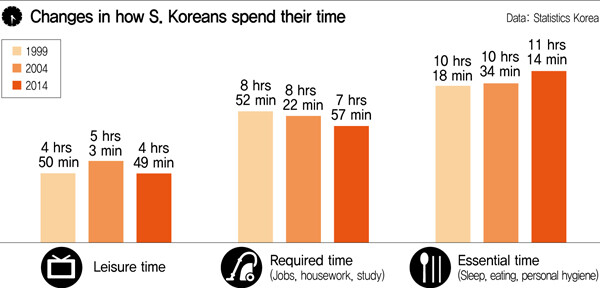hankyoreh
Links to other country sites 다른 나라 사이트 링크
Over 15 years, drop in S. Koreans’ time spent on jobs

South Koreans’ workaholic lifestyle has undergone slight changes over the past 15 years, new data show.
The differences include slightly more “essential time” for sleep, eating, bathing, and other survival needs, and slightly less “required time” for jobs and housework.
But 60% of respondents also said they still feel pressed for time.
Data on changes in lifestyle time patterns published by Statistics Korea on Apr. 20 showed South Koreans aged 10 and older spending an average of 11 hours and 14 minutes of “essential time” each day on sleep, eating, and personal health management as of 2014. The number was up 56 minutes from the 10 hours and 18 minutes recorded when similar studies were first conducted in 1999.
Meanwhile, the amount of “required time” spent on jobs, housework, study, and transit averaged 7 hours and 57 minutes - down 55 minutes from the 8 hours and 52 minutes found in 1999.
Required time spent on jobs showed a particularly steep decline, falling from 3 hours and 43 minutes to 3 hours and 16 minutes. The shift was interpreted as indicating a shift in time focus from work to individual needs. Leisure time remained largely unchanged at 4 hours and 49 minutes.
South Koreans were also found to be spending more time at home. For 2014, participants averaged 14 hours and 59 minutes at home, an increase of 24 minutes from the 14 hours and 35 minutes recorded in 1999. For housework, males averaged 39 minutes a day on weekdays, 61 minutes on Saturdays, and 73 minutes on Sundays. All three numbers were up significant from their respective 1999 levels of 30 minutes, 35 minutes, and 47 minutes.
But an equitable division of household labor still seems far away, with the study showing females spending an average of 3 hours and 25 minutes on it during the week, 3 hours and 37 minutes on Saturdays, and 3 hours and 33 minutes on Sunday. While each number was down roughly 30 minutes from 1999, they remained much larger than the averages for males.
Among employed persons over 20, average commuting time totaled 96 minutes for the greater Seoul area, or 25 minutes longer than the 71 minutes for the rest of South Korea. Student travel times to and from school were found to increase in higher grades, with averages of 59 minutes for elementary school students, 65 minutes for middle school students, and 69 minutes for high school students.
South Koreans aged 10 and older were also found to spent an average of 1 hours and 53 minutes watching television on weekdays, 2 hours and 31 minutes on Saturdays, and 2 hours and 51 minutes on Sundays. The numbers were up respectively by 29 minutes, 21 minutes, and 42 minutes from their 1999 levels.
Time spent reading books was found to be on the decline, with averages of six minutes recorded for weekdays, eight minutes for Saturdays, and nine minutes for Sundays. Just 9.7% of respondents said they spent 10 or more minutes reading on weekdays, while 10.2% reported doing so on Saturdays and 10.9% on Sundays.
By Noh Hyung-woong, staff reporter
Please direct questions or comments to [english@hani.co.kr]

Editorial・opinion
![[Column] Has Korea, too, crossed the Rubicon on China? [Column] Has Korea, too, crossed the Rubicon on China?](https://flexible.img.hani.co.kr/flexible/normal/500/300/imgdb/original/2024/0419/9317135153409185.jpg) [Column] Has Korea, too, crossed the Rubicon on China?
[Column] Has Korea, too, crossed the Rubicon on China?![[Correspondent’s column] In Japan’s alliance with US, echoes of its past alliances with UK [Correspondent’s column] In Japan’s alliance with US, echoes of its past alliances with UK](https://flexible.img.hani.co.kr/flexible/normal/500/300/imgdb/original/2024/0419/2317135166563519.jpg) [Correspondent’s column] In Japan’s alliance with US, echoes of its past alliances with UK
[Correspondent’s column] In Japan’s alliance with US, echoes of its past alliances with UK- [Editorial] Does Yoon think the Korean public is wrong?
- [Editorial] As it bolsters its alliance with US, Japan must be accountable for past
- [Guest essay] Amending the Constitution is Yoon’s key to leaving office in public’s good graces
- [Editorial] 10 years on, lessons of Sewol tragedy must never be forgotten
- [Column] A death blow to Korea’s prosecutor politics
- [Correspondent’s column] The US and the end of Japanese pacifism
- [Guest essay] How Korea turned its trainee doctors into monsters
- [Guest essay] As someone who helped forge Seoul-Moscow ties, their status today troubles me
Most viewed articles
- 1[Column] The clock is ticking for Korea’s first lady
- 2After 2 months of delayed, denied medical care, Koreans worry worst may be yet to come
- 3Hong Se-hwa, voice for tolerance whose memoir of exile touched a chord, dies at 76
- 4[Column] Has Korea, too, crossed the Rubicon on China?
- 5US overtakes China as Korea’s top export market, prompting trade sanction jitters
- 6Samsung barricades office as unionized workers strike for better conditions
- 7[Editorial] As it bolsters its alliance with US, Japan must be accountable for past
- 8[Correspondent’s column] In Japan’s alliance with US, echoes of its past alliances with UK
- 9All eyes on Xiaomi after it pulls off EV that Apple couldn’t
- 10[Correspondent’s column] The US and the end of Japanese pacifism